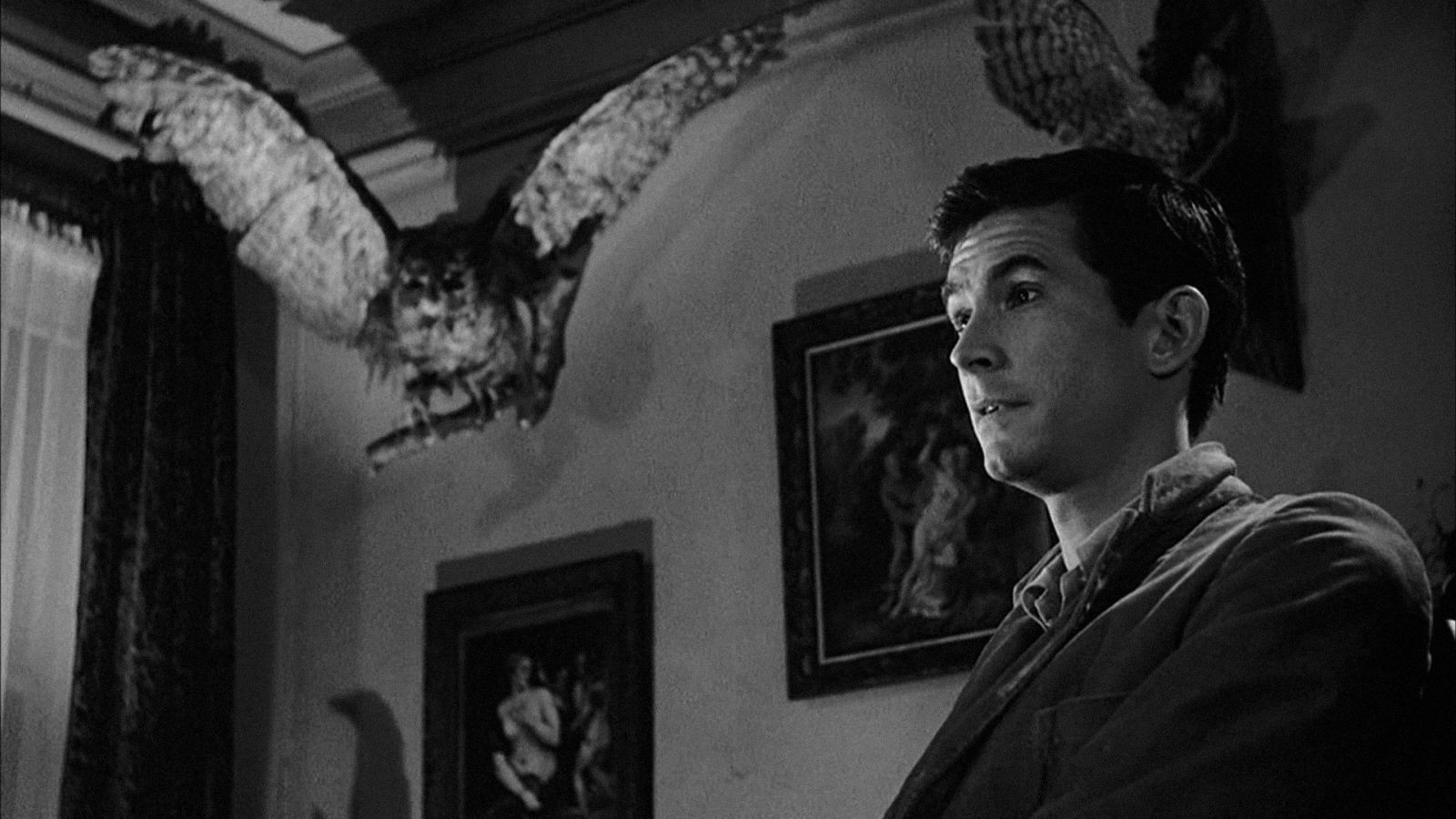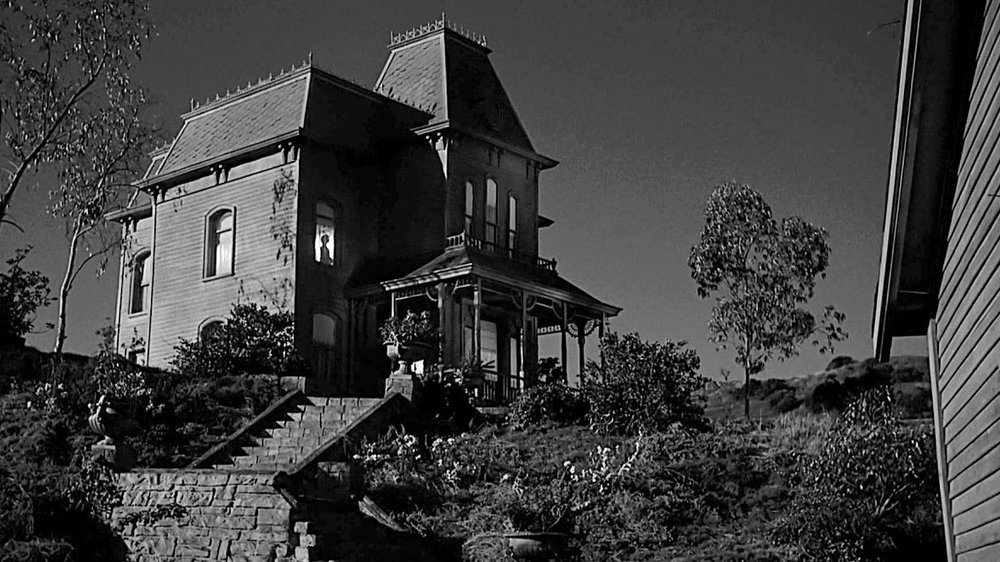Psycho | Directed by Alfred Hitchcock // Starring Anthony Perkins, Janet Leigh, Vera Miles, John Gavin, and Martin Balsam
Set the mood with some music!
Summary (Spoiler-free): Psycho is a psychological thriller from master director Alfred Hitchcock that starts off as one kind of story and slowly transforms into something far more disturbing. Centered around a young woman who steals a large sum of money and goes on the run, the film takes a sharp, unforgettable turn when she checks into the secluded Bates Motel — and meets its quietly unsettling proprietor, Norman.

If you were a film student in the 2000s, odds are you took a class where Psycho was shown frame by frame. I certainly did — my college Hitchcock course remains one of the most eye-opening experiences of my life and one that truly brought my love of film to another level. It made me understand that Hitchcock wasn’t just the “Master of Suspense” as the marketing often said… he was the master of tension. He didn’t just want you to jump — he wanted to keep you suspended, coiled, and waiting, without realizing how tightly he was winding you up. He reveled in that anxiety, and Psycho is arguably his most perfect example of that philosophy at work.
What makes Psycho so brilliant is how it constantly shifts the ground beneath your feet. The film begins with a crime thriller setup that could have been its own movie. And then, without warning, Hitchcock pivots the story into something else entirely. Something quieter. Stranger. More sinister. It was revolutionary at the time, and even now, decades later, it still feels bold. The tension doesn’t come from what you see, but from what you think might happen — from a lingering camera angle, a single line of dialogue, the way a character smiles just a second too long.
Hitchcock’s direction isn’t just impressive — it’s surgical. The man didn’t just know how to build suspense; he knew how to sustain it, how to twist it, how to turn the simple act of someone walking up stairs into the most anxiety-inducing experience imaginable.
Every frame is carefully constructed to make you feel something... usually discomfort. The pacing is almost unnerving by today’s standards. Scenes linger just a second longer than they should. Conversations stretch out in silence. The camera moves with a quiet confidence, sometimes gliding, sometimes staying completely still, letting you fill the silence with your own dread. Hitchcock’s genius wasn’t in cheap scares; it was in understanding how our brains work, how fear creeps in when we’re left alone with our thoughts.
And then, there’s the audacity of the narrative structure — the infamous pivot about halfway through the film. No one else would’ve dared to do that at the time. But Hitchcock didn’t care about convention. He wanted to surprise you, and not just with plot twists — with form. With how the story was told. With who you’re supposed to root for. That kind of boldness doesn’t just make a movie memorable. It makes it immortal.
In Psycho, Hitchcock wasn’t just directing a thriller. He was conducting a symphony of unease, and you feel every note.
Anthony Perkins’ performance as Norman Bates is an all-timer. It’s understated in a way that’s still deeply unsettling. He doesn’t come across as a villain. He’s awkward, kind, and sweet — and that’s exactly what makes everything so deeply wrong. Janet Leigh, as the film’s early lead, delivers a grounded and deeply empathetic performance that roots the film in reality before things unravel. The supporting cast — Vera Miles, Martin Balsam — all contribute to the mounting sense of dread in subtle but vital ways.

From a technical standpoint, Psycho was ahead of its time. The editing is masterful, particularly in its most famous sequences, where quick cuts and tight close-ups redefine what fear feels like onscreen. The black-and-white cinematography isn’t a limitation — it’s an asset. The shadows, the lighting, the silhouettes… it all adds to the atmosphere of moral and psychological ambiguity. Every detail is deliberate.
I also want to give a particular nod to the score. If Alfred Hitchcock was the master of suspense, then Bernard Herrmann was his accomplice. The score here doesn’t just support the tension — it is the tension. Those screeching violins in the infamous shower scene? Iconic. But what makes Herrmann’s work so brilliant is how much it elevates every other moment of the film, too.
This isn’t a score that sits in the background. It grabs you by the collar and shakes you. It’s jagged, aggressive, and relentless when it needs to be — but it also knows when to back off. There are long stretches of quiet, letting the dread fester. And then, when the music does return, it hits like a punch to the gut.
Simply put, the score is one of the most important elements of Psycho and practically reinvented horror movie music. It’s not just accompanying the horror — it’s composing it.
Psycho isn’t just a horror movie — it’s a cinematic magic trick. Hitchcock lures you in with one premise and then pulls the rug out from under you with surgical precision. It’s a film that weaponizes misdirection, pacing, and structure in ways that still influence modern thrillers to this day. More than six decades after its release, it still shocks, still mesmerizes, and still manages to make your skin crawl.
And the most astonishing part? You know what’s coming — and it still works.
This is Hitchcock at his most daring and devious. A movie that changed the rules, redefined a genre, and left an undeniable mark on the history of cinema. Psycho is a masterpiece of manipulation, of form, of performance. And for me, it’s the kind of film that only gets better the more you understand how it was made. It’s a lesson in tension, a clinic in storytelling, and a reminder that great filmmaking doesn’t just show you something — it makes you feel it. Deep in your bones.